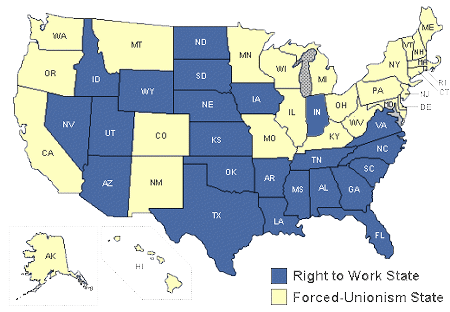This is something that always bothered me. If you want a job in a sector subject to unions, part of your paycheck goes to the union. Don't want to pay the union? You better find another line of work.
Glad they finally got it fixed in Michigan, the 24th state to pass a right to work law, and only the second state in the last decade. Unions put a measure on the ballot this last election that would have enshrined unions in the state constition, which not only failed miserably, but seemed to precipitate anti union forces pushing for right to work. This last election also gave a republican majority in the house and senate, and in a very quick move they passed the bill in both in one day.
http://www.nytimes.com/2012/12/12/u...michigan-union-limits-plan.html?smid=pl-share
Lots of other reporting on this, since Michigan is often viewed as a union stronghold.
https://www.google.com/search?q=michigan+right+to+work
Glad they finally got it fixed in Michigan, the 24th state to pass a right to work law, and only the second state in the last decade. Unions put a measure on the ballot this last election that would have enshrined unions in the state constition, which not only failed miserably, but seemed to precipitate anti union forces pushing for right to work. This last election also gave a republican majority in the house and senate, and in a very quick move they passed the bill in both in one day.
http://www.nytimes.com/2012/12/12/u...michigan-union-limits-plan.html?smid=pl-share
Lots of other reporting on this, since Michigan is often viewed as a union stronghold.
https://www.google.com/search?q=michigan+right+to+work

